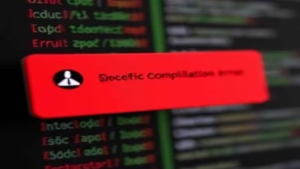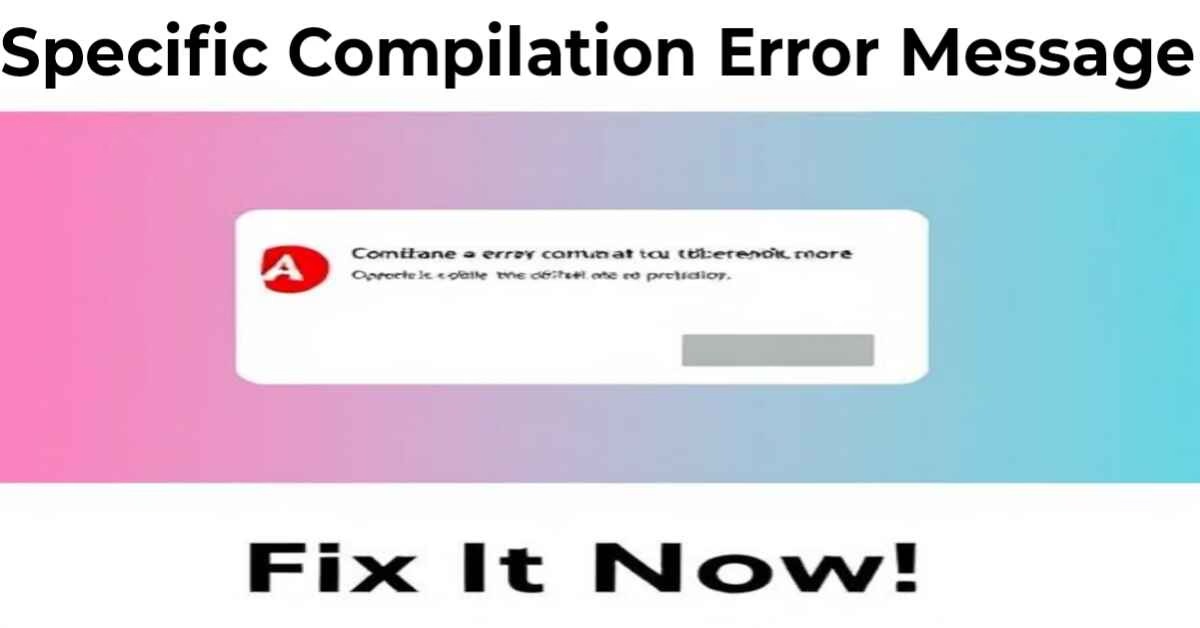Specific Compilation Error Message – Fix It Now!
Specific Compilation Error Message – Quick Fix & Expert Tips
Discover expert solutions to fix a specific compilation error message. Learn common causes, step-by-step troubleshooting, and best practices for error-free code.
When coding, encountering a compilation error message can be frustrating and time-consuming. However, with a systematic approach and the right strategies, you can quickly diagnose and fix these issues to keep your project on track.
This guide explains how to fix a specific compilation error message by breaking down common causes, troubleshooting methods, and best practices for error resolution.
Whether you’re a beginner or an experienced developer, these tips will help you overcome compilation hurdles and improve your overall coding workflow.
1. Understanding Compilation Errors
1.1 What Are Compilation Errors?
Compilation errors occur when the compiler is unable to convert source code into executable code. These errors can stem from syntax mistakes, missing dependencies, or inconsistencies in code.
The specific compilation error message you receive provides clues about what is wrong in your code.
Syntax Errors: These are mistakes in the code’s structure, such as missing semicolons or incorrect use of keywords.
Linker Errors: These errors appear when the linker cannot resolve references between different modules.
Dependency Errors: Often caused by missing libraries or incorrect paths in your project settings.
For more details on understanding compiler messages, visit the GCC documentation.
1.2 Why Fixing Compilation Errors Matters
Fixing compilation errors is essential for:
Ensuring Code Quality: Clean, error-free code is easier to maintain and scale.
Reducing Debugging Time: Quickly addressing errors improves development efficiency.
Successful Deployment: Error-free code leads to a more reliable and secure application.
2. Common Causes of Specific Compilation Error Messages
2.1 Missing or Incorrect Syntax
One of the most frequent causes of compilation errors is a simple syntax mistake. For example, a missing semicolon or bracket can cause the compiler to halt.
Example Error: “Expected ‘;’ before ‘}'”
Solution: Review your code carefully and ensure every statement is properly terminated.
2.2 Undefined References
An undefined reference error typically occurs when the compiler cannot find a function or variable declaration.
Example Error: “Undefined reference to functionName”
Solution: Check if the function is declared in the header file and defined in the source file. Ensure that all necessary libraries are linked correctly.
2.3 Incorrect Library Paths
When the compiler fails to locate the necessary libraries, it can throw a linker error.
Example Error: “Cannot open source file: ‘library.h'”
Solution: Verify that the library path is correctly specified in your project settings or build script. Updating environment variables like LD_LIBRARY_PATH can help resolve these issues.
2.4 Inconsistent Data Types
Errors can also occur if there is a mismatch between the data types expected by a function and those provided in the code.
Example Error: “Incompatible type for argument”
Solution: Check that the variables and function parameters match in data type. Casting variables explicitly might be necessary in some cases.
3. Step-by-Step Troubleshooting for Fixing Specific Compilation Error Messages
3.1 Analyze the Error Message
The first step in fixing any compilation error is to read the error message carefully. Look for keywords and line numbers that indicate where the problem lies.
Tip: Enable verbose mode in your compiler (e.g., gcc -v) to get more detailed output.
3.2 Check Your Code for Common Syntax Mistakes
Go through the code around the reported error and look for common mistakes:
Missing semicolons, brackets, or parentheses.
Typographical errors in variable names or function calls.
Incorrect nesting of code blocks.
3.3 Verify Function Declarations and Definitions
Ensure that functions and variables are declared correctly in header files and defined only once in the source files.
Action Step: Cross-reference your header and source files to ensure consistency.
3.4 Review Project Configuration and Library Paths
Make sure your build configuration includes all necessary libraries and that the paths are correct. This is especially important when integrating third-party libraries.
Action Step: Double-check your Makefile or project settings. Use tools like ldd on Linux to confirm that all shared libraries are correctly linked.
3.5 Clean and Rebuild Your Project
Sometimes, stale object files can cause persistent errors. Cleaning the build directory and recompiling from scratch can resolve these issues.
Command Example:
make clean && make
3.6 Use Diagnostic Tools
Advanced diagnostic tools can help you pinpoint the error more precisely:
nm: Lists symbols from object files to check for duplicate or missing symbols.
Valgrind: Helps detect memory issues that might lead to compiler or linker errors.
AddressSanitizer: A runtime tool to detect memory corruption.
For more information on these tools, check out the Valgrind documentation.
4. Best Practices to Prevent Compilation Errors
4.1 Consistent Coding Standards
Adopt consistent coding standards and practices. This minimizes the risk of introducing errors due to inconsistent formatting or naming conventions.
Tip: Use automated code formatters and linters such as ClangFormat or ESLint.
4.2 Regular Code Reviews
Conduct regular code reviews with peers to catch errors early. Collaborative reviews can uncover issues that might be overlooked by an individual.
4.3 Maintain Up-to-Date Documentation
Ensure that your project documentation is current. Detailed documentation helps in understanding project dependencies and the build process, making troubleshooting easier.
4.4 Continuous Integration (CI)
Implement CI pipelines to automatically compile and test your code with every change. CI systems like Jenkins, Travis CI, or GitHub Actions can catch errors before they reach production.
Learn more about CI best practices on Jenkins CI or Travis CI.

5. Advanced Techniques for Complex Compilation Issues
5.1 Modularize Your Code
Breaking your project into smaller, manageable modules can isolate errors and simplify debugging. Modular code is easier to test and maintain.
Tip: Use tools like CMake or Makefiles to manage project dependencies efficiently.
5.2 Utilize Version Control
Version control systems like Git allow you to track changes and revert to previous states when an error is introduced. This can be invaluable when trying to pinpoint the source of a specific compilation error.
Learn More: Git Documentation provides comprehensive guidance on version control.
5.3 Embrace Continuous Learning
Keep yourself updated with the latest compiler versions, libraries, and best practices. Follow relevant blogs, forums, and communities Stack Overflow to learn from other developers’ experiences with similar issues.
6. Real-world Examples and Case Studies
6.1 Case Study: Fixing Undefined References
A developer encountered an error stating “undefined reference to calculated.” After reviewing the code, they discovered that the function was declared in a header file but was missing in the source file.
Adding the proper definition resolved the error, emphasizing the importance of matching declarations with definitions.
6.2 Case Study: Resolving Multiple Definition Errors
In another instance, multiple definition errors arose from a variable declared in two different source files. The solution was to declare the variable as an extern in the header file and define it only once in a single source file, thereby eliminating the duplicate symbol error.
These examples highlight the practical steps needed to resolve specific compilation error messages and underscore the value of careful code management.
7. Conclusion: Mastering Specific Compilation Errors
Fixing a specific compilation error message is a fundamental skill for any developer.
By understanding the underlying causes—whether they be syntax errors, undefined references, or incorrect library paths—you can systematically troubleshoot and resolve issues that hinder your project’s progress.
Adopting best practices, utilizing diagnostic tools, and learning from real-world examples are key strategies to overcome these challenges.
With a methodical approach, you can ensure that your code compiles smoothly and efficiently, saving time and boosting productivity.
By continuously refining your debugging skills and staying informed about the latest development tools, you’ll be well-prepared to tackle any compilation error that comes your way.
Remember, every error resolved is a step toward becoming a more proficient and confident developer.
Call to Action:
If you found this guide useful, share it with fellow developers facing similar challenges and subscribe for more expert tips on debugging and software development. For further resources on compiler and linker troubleshooting, visit GNU ld Manual and Valgrind. Happy coding!
This comprehensive guide is designed to provide clear, actionable insights to help you fix a specific compilation error message, ensuring your development process remains as efficient and error-free as possible.


